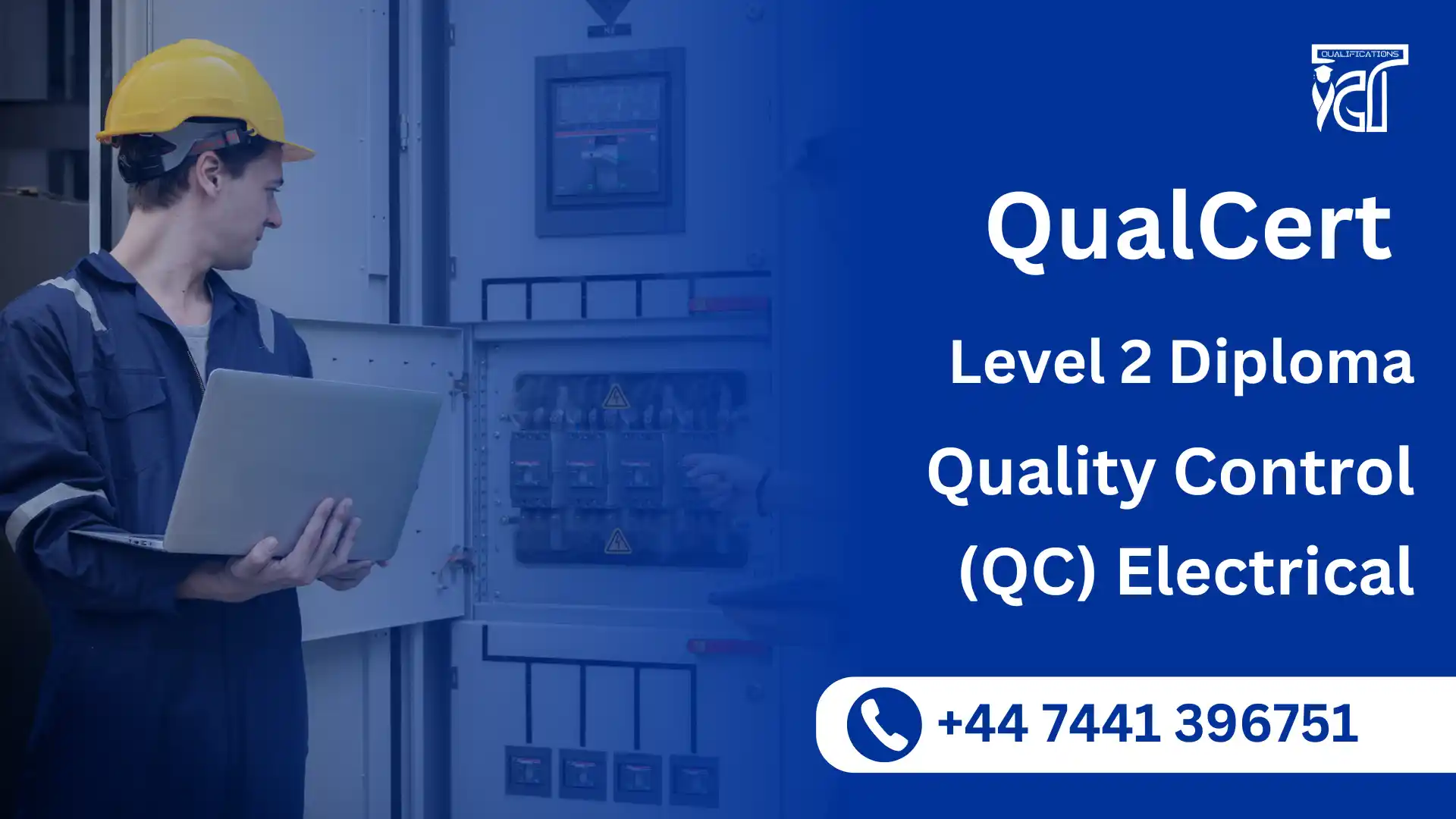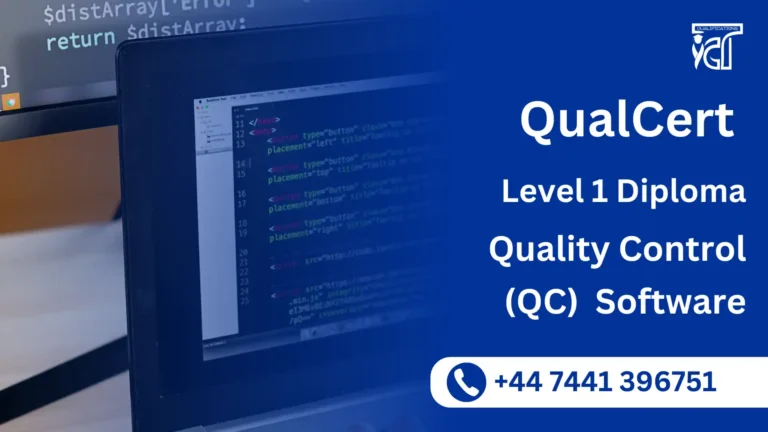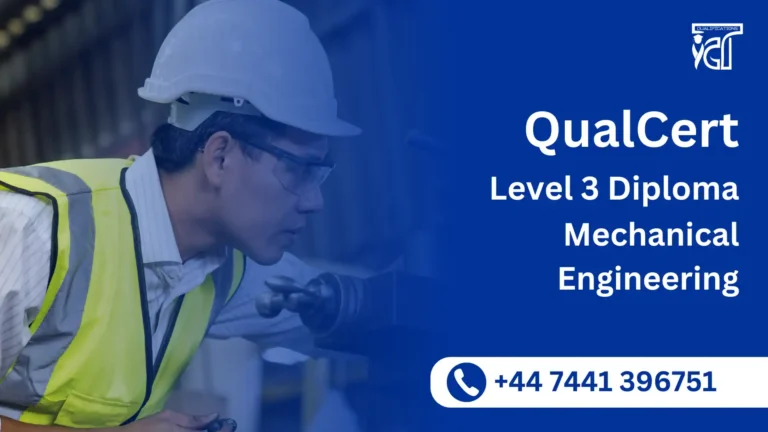The QualCert Level 2 Diploma in Quality Control (QC) – Electrical is an entry-level qualification designed to provide learners with foundational knowledge and practical skills in electrical quality control. This program is ideal for individuals who are new to the electrical or construction industries and are looking to build a career in quality assurance and control.
Through a combination of theoretical understanding and hands-on learning, learners will explore the essential principles of electrical systems, quality inspection procedures, testing methods, and safety compliance. The course emphasizes the importance of quality standards, documentation, and calibration techniques within the context of real-world electrical environments.
Whether you’re aiming to begin a career as a QC assistant, electrical technician, or site inspector, this diploma equips you with the confidence and competencies needed to perform basic quality control functions and support higher-level professionals in the field. It also serves as a stepping stone for further advancement into Level 3 and beyond in electrical engineering or quality management.
QualCert Level 2 Diploma in Quality Control (QC) Electrical
The QualCert Level 2 Diploma in Quality Control (QC) Electrical comprises several study units designed to provide learners with a comprehensive understanding of QC principles and practices in the electrical sector. Below is the qualification structure, including the Total Qualification Time (TQT) 210, Guided Learning Hours (GLH) 150, and 42 Credits associated with the program.
| Unit Ref# | Unit Title | Credit | GLH | TQT |
| QC100008 – 1 | Advanced Electrical Quality Control | 7 | 25 | 35 |
| QC100008 – 2 | Calibration and Measurement Techniques | 7 | 25 | 35 |
| QC100008 – 3 | Electrical Systems Safety and Compliance | 7 | 25 | 35 |
| QC100008 – 4 | Quality Assurance in Electrical Projects | 7 | 25 | 35 |
| QC100008 – 5 | Electrical Quality Control Reporting | 7 | 25 | 35 |
| QC100008 – 6 | Risk Management in Electrical Projects | 7 | 25 | 35 |
GLH (Guided Learning Hours) and TQT (Total Qualification Time) are terms commonly used in vocational qualifications to help define the amount of time a learner is expected to spend on their studies.
1. GLH (Guided Learning Hours)
GLH refers to the number of hours a learner spends being directly taught, supervised, or supported during their course. This includes the time spent in activities such as:
- Classroom instruction
- Practical workshops
- One-on-one tutoring or mentoring sessions
- Online learning sessions with tutor support
In other words, GLH represents the time that learners are actively engaged with their instructors or learning activities.
2. TQT (Total Qualification Time)
TQT represents the total amount of time a learner is expected to invest in completing a qualification, including:
- GLH (Guided Learning Hours): Time spent on direct learning, as explained above.
- Self-Directed Learning: This includes time spent on independent study, research, assignment completion, preparation for exams, and any other work the learner does outside of direct teaching hours.
TQT is a broader measure that includes all the time required to achieve the qualification. It helps learners and employers understand the overall commitment required for the qualification.
Key Differences Between GLH and TQT:
- GLH focuses on direct learning with guidance or supervision.
- TQT includes GLH as well as independent study time and other learning-related activities.
Example:
If a qualification has a TQT of 600 hours and a GLH of 250 hours, it means the learner should spend 250 hours in direct learning (classroom, online, or tutor-led sessions) and 350 hours on independent study or research.
Advanced Electrical Quality Control
Gain in-depth knowledge of advanced electrical quality control concepts and techniques.
Learn to detect faults, inconsistencies, and non-compliance in electrical systems.
Apply established industry standards and best practices to ensure consistent quality and system reliability.
Calibration and Measurement Techniques
Build proficiency in the use of calibration equipment and precision measurement tools.
Analyze measurement data to verify the accuracy and functionality of electrical systems.
Execute calibration procedures in line with regulatory and technical standards.
Electrical Systems Safety and Compliance
Evaluate electrical systems to ensure adherence to safety codes and compliance regulations.
Recognize and address potential electrical hazards through corrective measures.
Understand and apply legal frameworks and industry protocols governing electrical safety.
Quality Assurance in Electrical Projects
Design and implement quality assurance frameworks tailored for electrical engineering projects.
Conduct structured quality checks to verify that all project elements align with specifications.
Identify and resolve quality concerns during all phases of electrical project execution.
Electrical Quality Control Reporting
Create accurate, well-structured quality control reports for inspections and audits.
Document quality issues, corrective actions taken, and overall compliance outcomes.
Present findings to project teams and stakeholders in a clear, professional manner.
Risk Management in Electrical Projects
Identify potential risks that could affect quality, safety, or compliance in electrical projects.
Develop and apply risk mitigation plans to safeguard project performance.
Introduce proactive quality measures to minimize disruptions and ensure consistent outcomes.
Course Benefits
✅ Foundational Knowledge
Gain a strong understanding of the core principles of quality control in electrical systems, setting the stage for further career or academic progression.
✅ Practical Skills Development
Learn hands-on inspection, testing, and documentation techniques that are directly applicable to real-world electrical projects.
✅ Improved Job Readiness
Build the confidence and competencies needed to begin work in entry-level QC roles within electrical or construction sectors.
✅ Health & Safety Awareness
Understand essential safety protocols and risk management procedures to maintain compliance and reduce hazards on-site.
✅ Career Advancement Opportunities
Use this qualification as a stepping stone to more advanced diplomas (Level 3 and above) in quality control, electrical engineering, or project supervision.
✅ Increased Employability
Stand out to employers by demonstrating certified knowledge and skills in a niche but high-demand field like electrical quality assurance.
✅ Versatile Industry Relevance
Applicable across residential, commercial, and industrial electrical settings, making it suitable for a wide range of roles and work environments.
Ideal Learner for QualCert Level 2 Diploma in Quality Control (QC) – Electrical
Beginners in the Electrical Field
This qualification is ideal for individuals who are new to the electrical industry or just beginning their career in quality control. It provides the foundational knowledge needed to understand basic electrical systems, safety standards, and quality control procedures.
School Leavers and Vocational Students
School graduates and vocational training students looking to gain technical knowledge and practical skills in electrical inspection, testing, and compliance will benefit greatly from this course. It serves as a gateway into technical careers in the construction and electrical sectors.
Entry-Level Technicians and Helpers
Those currently working in supporting roles—such as electrical helpers, maintenance assistants, or junior technicians—will find this course useful for building a strong quality assurance mindset and moving toward more specialized responsibilities.
Career Changers and Aspiring Professionals
The course is also suitable for individuals from non-technical backgrounds who want to switch to a career in electrical quality control. It introduces core concepts and helps learners develop practical skills required for entry-level positions in the field.
Progression-Oriented Learners
This diploma is an excellent choice for learners who aim to progress to higher-level qualifications. It lays a solid foundation for continuing education in electrical QA/QC, eventually leading to supervisory or managerial roles in quality control.
Entry Requirements
Entry Requirements: QualCert Level 2 Diploma in Quality Control (QC) – Electrical
Age Requirement
Applicants must be at least 16 years old at the time of enrollment. This ensures a basic level of maturity and readiness for vocational training in electrical quality control.
Educational Background
While there are no strict academic prerequisites, a basic secondary school education (such as completion of matriculation or equivalent) is recommended. This helps learners grasp fundamental concepts in mathematics, science, and technical subjects relevant to the course.
Work Experience
No prior work experience in electrical or quality control is required. The course is designed for entry-level learners, making it accessible to individuals who are new to the field.
English Language Proficiency
Since course materials and assessments are provided in English, learners should have a basic understanding of written and spoken English. This is essential for understanding technical terms, reading safety guidelines, and completing assignments or assessments effectively.
Register Now
Qualification Process
Qualification Process for the QualCert Level 2 Diploma in Quality Control (QC) Electrical
- Self-Assessment:
Begin by evaluating your eligibility to ensure you meet the qualification requirements, including work experience, knowledge, and language proficiency. - Registration:
Complete your registration by submitting the required documents, including a scanned copy of a valid ID, and paying the registration fee. - Induction:
An assessor will conduct an induction to confirm your eligibility for the course and explain the evidence requirements. If you do not meet the criteria, your registration will be canceled, and the fee will be refunded. - Assignmnets & Evidence Submission:
Provide all assignmnets and the necessary evidence based on the assessment criteria outlined in the course. If you are unsure of the required evidence, consult with the assessor for guidance on the type and nature of evidence needed. - Feedback and Revision:
The assessor will review your submitted evidence and provide feedback. Evidence that meets the criteria will be marked as “Criteria Met,” while any gaps will be identified. You will be asked to revise and resubmit if needed. - Competence Evidence:
Submit final evidence demonstrating that all learning outcomes have been met. This evidence will be marked as “Criteria Met” by the assessor once it is satisfactory. - Internal Quality Assurance (IQA):
The Internal Quality Assurance Verifier (IQA) will review your evidence to ensure consistency, quality, and compliance with standards. - External Verification:
The IQA will submit your portfolio to QualCert External Quality Assurance Verifiers (EQA) for final confirmation. The EQA may contact you directly to verify the authenticity of your evidence. - Certification:
Upon successful completion of all checks, QualCert will issue your official certificate, confirming that you have attained the QualCert Level 2 Diploma in Quality Control (QC) Electrical.







